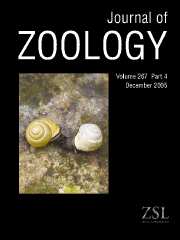Crossref Citations
This article has been cited by the following publications. This list is generated based on data provided by
Crossref.
Bininda-Emonds, Olaf R.P.
2004.
The evolution of supertrees.
Trends in Ecology & Evolution,
Vol. 19,
Issue. 6,
p.
315.
Ricci, M.
and
Breed, W. G.
2005.
Morphogenesis of the fibrous sheath in the marsupial spermatozoon.
Journal of Anatomy,
Vol. 207,
Issue. 2,
p.
155.
Moran, Shlomo
Rao, Satish
and
Snir, Sagi
2005.
Algorithms in Bioinformatics.
Vol. 3692,
Issue. ,
p.
89.
Price, Samantha A.
Bininda‐Emonds, Olaf R. P.
and
Gittleman, John L.
2005.
A complete phylogeny of the whales, dolphins and even‐toed hoofed mammals (Cetartiodactyla).
Biological Reviews,
Vol. 80,
Issue. 3,
p.
445.
White, Craig R.
Matthews, Philip G. D.
and
Seymour, Roger S.
2006.
Balancing the competing requirements of saltatorial and fossorial specialisation: burrowing costs in the spinifex hopping mouse,Notomys alexis.
Journal of Experimental Biology,
Vol. 209,
Issue. 11,
p.
2103.
Phillips, Matthew J.
McLenachan, Patricia A.
Down, Christin
Gibb, Gillian C.
Penny, David
and
Lee, Mike
2006.
Combined Mitochondrial and Nuclear DNA Sequences Resolve the Interrelations of the Major Australasian Marsupial Radiations.
Systematic Biology,
Vol. 55,
Issue. 1,
p.
122.
WEISBECKER, VERA
and
SÁNCHEZ-VILLAGRA, MARCELO R.
2006.
Carpal evolution in diprotodontian marsupials.
Zoological Journal of the Linnean Society,
Vol. 146,
Issue. 3,
p.
369.
Chen, Duhong
Eulenstein, Oliver
Fernández-Baca, David
and
Burleigh, J. Gordon
2006.
Improved Heuristics for Minimum-Flip Supertree Construction.
Evolutionary Bioinformatics,
Vol. 2,
Issue. ,
Cáceres, N. C.
and
Carmignotto, A. P.
2006.
Caluromys lanatus.
Mammalian Species,
Vol. 803,
Issue. ,
p.
1.
Snir, Sagi
and
Rao, Satish
2006.
Using Max Cut to Enhance Rooted Trees Consistency.
IEEE/ACM Transactions on Computational Biology and Bioinformatics,
Vol. 3,
Issue. 4,
p.
323.
Mank, J. E.
and
Avise, J. C.
2006.
The evolution of reproductive and genomic diversity in ray‐finned fishes: insights from phylogeny and comparative analysis.
Journal of Fish Biology,
Vol. 69,
Issue. 1,
p.
1.
Wroe, Stephen
and
Milne, Nicholas
2007.
CONVERGENCE AND REMARKABLY CONSISTENT CONSTRAINT IN THE EVOLUTION OF CARNIVORE SKULL SHAPE.
Evolution,
Vol. 61,
Issue. 5,
p.
1251.
Johnson, Christopher N
Isaac, Joanne L
and
Fisher, Diana O
2007.
Rarity of a top predator triggers continent-wide collapse of mammal prey: dingoes and marsupials in Australia.
Proceedings of the Royal Society B: Biological Sciences,
Vol. 274,
Issue. 1608,
p.
341.
LADEVÈZE, SANDRINE
2007.
Petrosal bones of metatherian mammals from the Late Palaeocene of Itaboraí (Brazil), and a cladistic analysis of petrosal features in metatherians.
Zoological Journal of the Linnean Society,
Vol. 150,
Issue. 1,
p.
85.
Potter, Sally
Orgeig, Sandra
Donnellan, Stephen
and
Daniels, Christopher B.
2007.
Purifying selection drives the evolution of surfactant protein C (SP-C) independently of body temperature regulation in mammals.
Comparative Biochemistry and Physiology Part D: Genomics and Proteomics,
Vol. 2,
Issue. 2,
p.
165.
Felső, Bernadett
and
Rózsa, Lajos
2007.
Diving behavior reduces genera richness of lice (Insecta, Phthiraptera) of mammals.
Acta Parasitologica,
Vol. 52,
Issue. 1,
Wilkinson, Mark
Cotton, James A.
Lapointe, François-Joseph
Pisani, Davide
and
Page, Rod
2007.
Properties of Supertree Methods in the Consensus Setting.
Systematic Biology,
Vol. 56,
Issue. 2,
p.
330.
Kear, Benjamin P.
and
Pledge, Neville S.
2007.
A new fossil kangaroo from the Oligocene-Miocene Etadunna Formation of Ngama Quarry, Lake Palankarinna, South Australia.
Australian Journal of Zoology,
Vol. 55,
Issue. 6,
p.
331.
LADEVÈZE, SANDRINE
and
DE MUIZON, CHRISTIAN
2007.
THE AUDITORY REGION OF EARLY PALEOCENE PUCADELPHYDAE (MAMMALIA, METATHERIA) FROM TIUPAMPA, BOLIVIA, WITH PHYLOGENETIC IMPLICATIONS.
Palaeontology,
Vol. 50,
Issue. 5,
p.
1123.
Ribeiro, Marcel Cintra Pereira
and
Bicudo, José Eduardo Pereira Wilken
2007.
Oxygen consumption and thermoregulatory responses in three species of South American marsupials.
Comparative Biochemistry and Physiology Part A: Molecular & Integrative Physiology,
Vol. 147,
Issue. 3,
p.
658.


